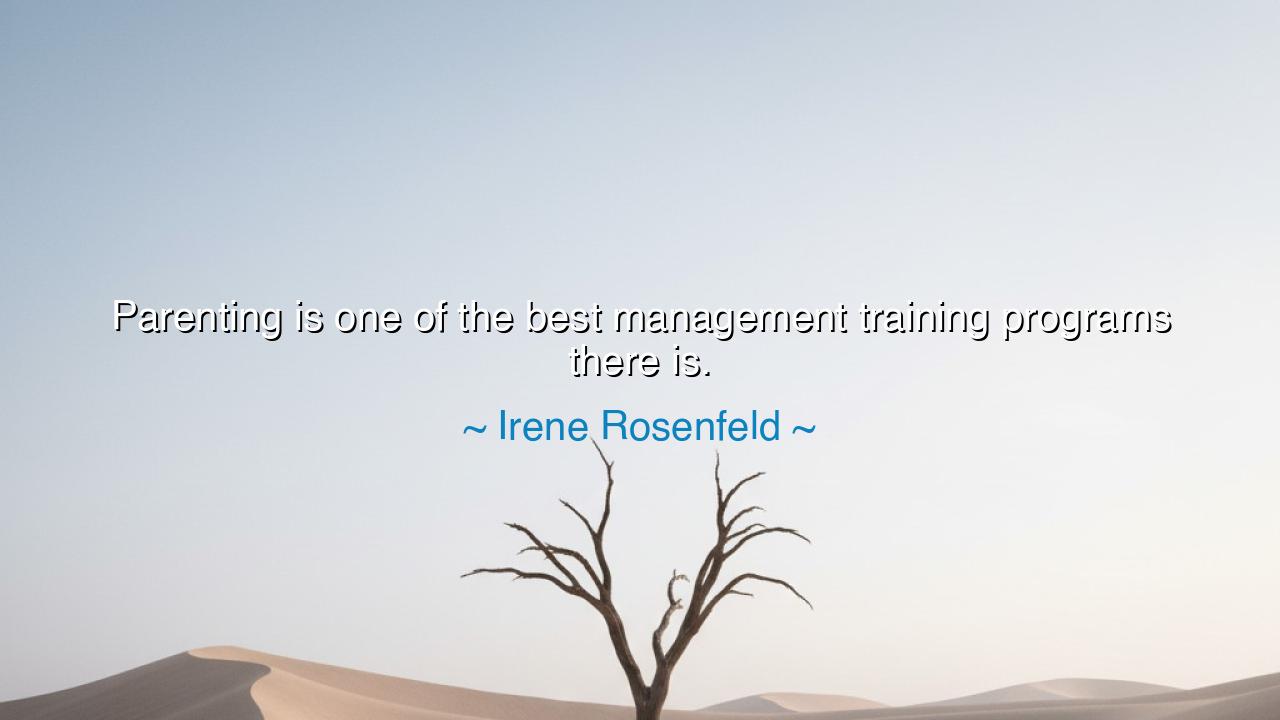
Parenting is one of the best management training programs there






The words of Irene Rosenfeld—“Parenting is one of the best management training programs there is.”—reveal a truth that the ancients themselves would have honored. For the household has always been the first kingdom, and the parent, whether mother or father, has always been the ruler of that kingdom. To raise a child is not merely to nurture; it is to govern, to organize, to balance resources, to anticipate crises, and to inspire loyalty through love. In this sacred labor, parents learn the same skills that guide leaders of nations and captains of commerce. The nursery is a boardroom, the kitchen table a council chamber, and the child, like every subject, must be guided with both firmness and compassion.
In times long past, philosophers observed that the state is but an echo of the family. Confucius taught that harmony in the household leads to harmony in the empire. Plato, in The Republic, drew parallels between the raising of children and the ruling of cities. To govern others, one must first learn to govern oneself and one’s home. Thus, Rosenfeld’s insight is not new, but a continuation of an ancient chain: that the art of management—whether of people, wealth, or destiny—begins with the humbling and heroic art of parenting.
Consider the life of Marcus Aurelius, emperor of Rome, philosopher, and father. In his Meditations, he wrote not only of leading soldiers and statesmen but of the patience required in raising his children. To face rebellion in the provinces was one task; to face the stubborn will of a child was another, yet both demanded calmness, resilience, and foresight. The emperor knew that the lessons of the hearth prepared him for the struggles of the throne, for in both, the leader is tested in endurance, fairness, and vision.
What Rosenfeld makes clear is that parenting trains the soul in leadership because it forces us to balance contradictions. A parent must be gentle and firm, patient yet decisive, protective but willing to let go. So too must a leader. A parent learns to negotiate between siblings, to motivate without crushing the spirit, to recognize talents and weaknesses, to set goals and boundaries. These are not different from the skills of those who guide teams, companies, or nations. To raise children well is to learn the deepest lessons of management—lessons written not in textbooks but in sleepless nights, small victories, and the daily struggles of love.
But unlike the manager of an office, the parent cannot resign from their post. The bond is eternal, and the stakes are not profit or loss, but the shaping of souls. This makes the training all the more powerful, for it is forged in responsibility that cannot be cast aside. Parents learn endurance, adaptability, and creativity because they must. It is this crucible that produces leaders who are not only skilled but compassionate, not only strategic but deeply human.
The lesson is this: do not underestimate the wisdom gained in the ordinary tasks of the household. The one who soothes a crying child learns the patience to calm an angry crowd. The one who explains gently to a curious daughter learns the clarity to inspire a team. The one who sacrifices rest to care for family learns the discipline that sustains great endeavors. What may appear simple and domestic is, in truth, the training ground for the highest forms of leadership.
Therefore, let your actions be these: treat parenting as a noble apprenticeship. Recognize that every challenge in the home is a lesson in leadership. Do not scorn the difficulties of family life, but embrace them as opportunities to grow in wisdom, resilience, and compassion. Share the skills you learn at home in the workplace, and bring the lessons of the workplace back into the home, weaving the two into a single tapestry of growth.
Thus, Irene Rosenfeld’s words shine like a beacon: parenting is not only about raising children, but about raising leaders—within ourselves. The parent who learns to guide with love becomes the leader who inspires with vision. The lessons of the hearth echo into the halls of power, and the strength built in the family becomes the strength of the world.






AAdministratorAdministrator
Welcome, honored guests. Please leave a comment, we will respond soon